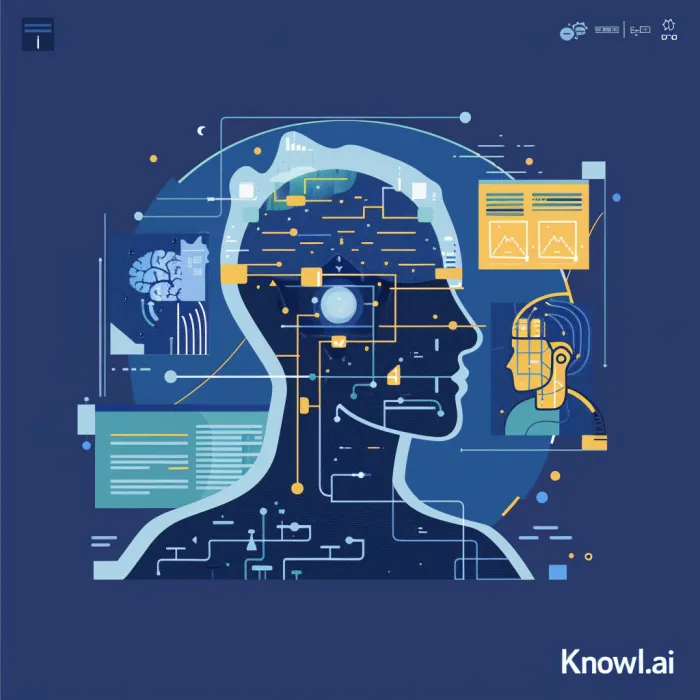What is the Role of API in Banking?
Understanding the Basics of API in Banking
Imagine a world where banking is as easy as ordering your favorite coffee through an app. That's the reality APIs are creating in the banking sector. APIs, or Application Programming Interfaces, serve as the bridge between various financial services and applications, allowing them to communicate seamlessly.
In banking, this means enabling everything from viewing your bank account balance on your phone to making payments without ever touching physical money. APIs have ushered in an era of open banking, where data flows freely between banks and third-party providers, fostering innovation and personalized financial services.
Key Takeaway: APIs are the backbone of modern banking, facilitating seamless interaction between financial institutions and third-party services to offer a more integrated and personalized banking experience.

Benefits of API Integration in Banking
Diving deeper into the API treasure trove reveals a chest of benefits. API integration in banking doesn't just simplify transactions; it revolutionizes customer experiences. Customers enjoy more control over their financial data, benefit from tailored banking services, and experience frictionless banking operations. For banks and fintechs, APIs mean access to a broader market, the ability to innovate rapidly, and the opportunity to create new revenue streams through Banking as a Service (BaaS) models. APIs are not just tools; they are the catalysts for creating a more agile, customer-centric financial ecosystem.
Key Takeaway: The integration of APIs in banking enhances customer experience, drives innovation, and opens new revenue channels for financial institutions, cementing their role as indispensable assets in the financial industry.
APIs in Banking: Enhancing Financial Services
In the landscape of 2024's banking sector, APIs are the architects of financial services innovation. They empower banks and fintechs to launch products and services with unprecedented speed and flexibility. From facilitating real-time payments to enabling secure, on-the-go access to financial data, APIs are at the heart of developing services that meet the evolving needs of modern consumers. Moreover, APIs play a crucial role in expanding financial inclusion, bringing banking services to underserved communities through mobile technology. As the linchpin of banking API integration, they foster a more inclusive, efficient, and innovative financial services ecosystem.
Key Takeaway: APIs are pivotal in enhancing the quality, accessibility, and innovation of financial services, shaping a banking industry that is more inclusive, customer-focused, and adaptable to the fast-paced digital world.
How Does API Banking Benefit Financial Institutions?
Utilizing APIs for Seamless Integration
Imagine a world where financial institutions can effortlessly connect their core banking systems to a myriad of services and applications, creating a seamless ecosystem of financial operations. This world is made possible through API banking, which allows banks to offer a more cohesive and integrated online banking experience.
By leveraging bank API integration, financial institutions can extend their reach, connecting with fintech companies, business banking partners, and digital banking services. This not only streamlines banking functions but also opens up new avenues for collaboration and innovation, making banking more accessible, efficient, and tailored to the modern user’s needs.
Key Takeaway: APIs serve as the building blocks for creating a connected and integrated financial ecosystem, enhancing operational efficiency and fostering innovation.
APIs in Banking Services: Transforming User Experience
Dive deeper into the realm of API banking, and you'll discover its profound impact on transforming the user experience. Open banking APIs have paved the way for a more transparent, flexible, and user-centric banking experience. Customers can now enjoy personalized financial services, ranging from comprehensive account information at their fingertips to tailored financial advice based on their banking history.
By integrating APIs into banking platforms, financial institutions can offer features like real-time account updates, payment initiation services, and a holistic view of the user’s bank account across different banks. This revolution in banking services not only empowers consumers but also sets a new standard for what users expect from their banking experience.
Key Takeaway: Open banking APIs are at the forefront of enhancing user experience, offering personalized, convenient, and secure access to financial services.

API Banking Solutions for Modern Financial Platforms
As we gaze into the crystal ball of the future of banking, API banking solutions stand out as the architects of modern financial platforms. The flexibility and scalability offered by APIs enable banks and fintech service providers to rapidly adapt to changing market demands and regulatory environments. From mobile banking to complex business banking solutions, APIs facilitate a wide range of banking functions, making them more accessible and user-friendly. Financial institutions that harness the power of API banking are better positioned to lead the charge in digital transformation, offering innovative services that meet the expectations of today’s tech-savvy consumers.
Key Takeaway: API banking is the cornerstone of modern financial platforms, driving innovation and enabling financial institutions to meet the evolving demands of the digital age.
What Are the Use Cases of API in Banking?
APIs have revolutionized the world of banking, enabling seamless integration and enhancing financial technology. Let's explore the diverse use cases of APIs in banking systems.
APIs for Money Transfer: APIs facilitate quick and secure money transfers between accounts, enabling users to manage their finances efficiently. Whether it's peer-to-peer transactions or payments to merchants, APIs streamline the process, enhancing user experience and reducing transaction times.
Enhancing Financial Services: Banking APIs allow companies to build products around banking services, providing customers with innovative solutions for budgeting, investing, and managing their wealth. From personalized financial insights to automated savings features, APIs enable fintech companies to offer tailored services that meet diverse customer needs.
Access to Global Banking Capabilities: APIs enable seamless integration with banking systems worldwide, granting businesses access to a broader range of financial services and markets. Through APIs, companies can build products that leverage global banking capabilities, expanding their reach and enhancing their competitiveness in the market.
Implementing API Banking for Business Transactions
Intro: In the dynamic world of banking, APIs play a crucial role in facilitating business transactions and improving operational efficiency. Let's delve into how companies build products around banking services using API banking.
Streamlining Account Management: APIs empower businesses to access banking services programmatically, enabling seamless integration with their existing systems. By leveraging APIs for account management, companies can automate processes such as balance inquiries, transaction monitoring, and account reconciliation, reducing manual effort and improving accuracy.
Facilitating Secure Transactions: APIs provide a secure framework for conducting business transactions, ensuring data confidentiality and integrity throughout the process. By implementing API banking, companies can facilitate secure payments, transfers, and other financial transactions, fostering trust and confidence among customers and partners.
Enabling Real-time Notifications: APIs enable real-time communication between banking systems and external applications, allowing businesses to receive instant notifications for important events such as incoming payments, account updates, or fraudulent activities. Real-time notifications empower companies to respond promptly to changes in their financial status, mitigating risks and optimizing decision-making processes.
Key Takeaway: API banking enables real-time notifications, empowering businesses to make timely decisions and mitigate financial risks effectively.
Third-Party Integration via Open Banking APIs
Open banking refers to the practice of granting third-party developers access to banking data and services through APIs. Let's explore how open banking APIs facilitate seamless integration and innovation in the world of banking.
Empowering Financial Innovation: Open banking APIs unlock a world of possibilities for fintech companies, allowing them to build innovative products and services that leverage banking data and functionality. By granting access to account information, payment initiation, and other banking services, open banking APIs enable fintech startups to create disruptive solutions that address specific customer needs and pain points.
Enhancing Customer Experience: Open banking APIs enable seamless integration between banking systems and third-party applications, enhancing the overall customer experience. By aggregating financial data from multiple sources, such as banks, investment accounts, and budgeting apps, open banking APIs empower users to view their entire financial portfolio in one place, gaining a comprehensive understanding of their financial health and making informed decisions.
Promoting Competition and Choice: Open banking APIs promote competition in the banking industry by fostering collaboration between traditional banks and innovative fintech startups. By enabling third-party developers to access banking data and services, open banking APIs create a level playing field where companies compete based on the quality of their products and services, ultimately benefiting consumers with greater choice and better offerings.
Key Takeaway: Open banking APIs promote competition and choice in the banking industry, driving innovation and improving customer outcomes.
Optimizing Banking Services through API Calls
The use of APIs has transformed the way banking services are delivered, offering unprecedented flexibility and efficiency. Let's explore how banks can optimize their services through API calls and deliver value to customers.
Seamless Integration with External Systems: API architecture allows banks to seamlessly integrate their services with external systems, such as payment gateways, accounting software, and customer relationship management (CRM) platforms. By exposing their functionalities through well-documented APIs, banks can facilitate smooth interactions with third-party applications, enabling customers to access banking services from their preferred platforms.
Personalized Financial Insights: Banks can leverage APIs to provide customers with personalized financial insights and recommendations based on their transaction history, spending patterns, and financial goals. By analyzing banking data and generating actionable insights, banks can empower customers to make informed financial decisions, such as budgeting, saving, and investing, thereby improving their overall financial well-being.
Enhanced Security and Compliance: API-based interactions between banks and external systems are subject to rigorous security and compliance standards to ensure the confidentiality, integrity, and availability of sensitive financial information. By implementing robust security measures, such as encryption, authentication, and access controls, banks can safeguard customer data and mitigate the risk of fraud or unauthorized access, fostering trust and confidence among customers.
Key Takeaway: API calls facilitate enhanced security and compliance in banking services, safeguarding customer data and maintaining trust.
Exploring the Future of Open Banking and API Integration
As the banking industry continues to evolve, open APIs are revolutionizing the way banks and fintech companies collaborate and innovate. Let's delve into the future of open banking and API integration.
Open APIs: The Gateway to Innovation: Open APIs serve as the gateway to innovation in the banking industry, enabling seamless integration between banks and fintech companies. By opening up their systems and data, banks empower developers to create innovative solutions that enhance the banking experience for customers and drive industry-wide transformation.
Collaborative Opportunities: API banking solutions facilitate collaboration between traditional banks and fintech startups, creating opportunities for mutual growth and innovation. Through strategic partnerships and integrations, banks can leverage fintech services to enhance their offerings, while fintech companies gain access to a broader customer base and infrastructure, fueling industry-wide innovation and disruption.
Empowering Financial Inclusion: Open banking and API integration democratize access to financial services, making banking more accessible and inclusive for underserved populations. By leveraging APIs, banks and fintech companies can develop tailored solutions for specific customer segments, such as unbanked or underbanked individuals, addressing their unique needs and improving financial inclusion globally.
Key Takeaway: Open APIs promote financial inclusion by enabling the development of tailored solutions for underserved populations, bridging the gap between traditional banking and marginalized communities.
The Impact of APIs on Fintech and Banking Collaboration
APIs have fundamentally transformed the way banks and fintech companies collaborate, leading to a paradigm shift in the banking industry. Let's explore the impact of APIs on fintech and banking collaboration.
Streamlining Banking Operations: API integration empowers banks to streamline their operations and enhance efficiency by automating processes and enabling real-time data exchange. Whether it's automating account verification or facilitating instant payments, APIs enable banks to optimize their workflows, reduce operational costs, and deliver faster, more responsive services to customers.
Enhancing Customer Experiences: APIs enable banks to offer personalized and seamless customer experiences by integrating fintech services directly into their platforms. Whether it's providing personalized financial insights or offering frictionless payment options, API-enabled integrations enhance the overall banking experience for customers, driving satisfaction and loyalty.
Facilitating Innovation and Differentiation: APIs enable banks to differentiate themselves in the market by offering innovative products and services that meet evolving customer needs. By leveraging fintech solutions and integrating third-party services via APIs, banks can create unique value propositions, attract new customers, and stay ahead of competitors in an increasingly crowded market.
Key Takeaway: APIs facilitate innovation and differentiation in banking by enabling banks to offer unique products and services that meet evolving customer needs, driving market competitiveness and growth.
Enhancing Banking Functions with APIs and Fintech Services
The convergence of APIs and fintech services is revolutionizing traditional banking functions, offering customers a plethora of innovative solutions and experiences. Let's explore how APIs and fintech services are enhancing banking functions.
Seamless Integration for Enhanced Services: API banking solutions enable seamless integration between banks and fintech services, allowing customers to access a wide range of financial products and services from a single platform. Whether it's budgeting apps, investment platforms, or payment gateways, APIs facilitate frictionless interactions, enabling customers to manage their finances more effectively and efficiently.
Real-time Access to Banking Data: APIs provide real-time access to banking data, enabling customers to monitor their accounts, track transactions, and receive instant notifications on their preferred devices. By leveraging APIs, banks can offer customers a comprehensive view of their financial health, empowering them to make informed decisions and take control of their finances with confidence.
Driving Innovation in Digital Banking: APIs are driving innovation in digital banking by enabling banks to rapidly deploy new features and services in response to changing customer needs and market dynamics. Whether it's launching innovative payment solutions, introducing AI-powered financial insights, or enabling voice-activated banking experiences, APIs provide the flexibility and agility banks need to stay ahead in the digital age.
APIs Revolutionizing the Banking Experience for Users
APIs are revolutionizing the banking experience for users, offering unprecedented convenience, accessibility, and personalization. Let's explore how APIs are reshaping the banking landscape for users.
Personalized Financial Management: APIs empower users to personalize their financial management experience by integrating banking services with their preferred apps and platforms. Whether it's tracking expenses, setting savings goals, or managing investments, APIs enable users to tailor their financial workflows to suit their individual needs and preferences, fostering greater control and empowerment over their finances.
Enhanced Accessibility and Convenience: APIs make banking more accessible and convenient by enabling users to access their accounts and perform transactions anytime, anywhere, and on any device. Whether it's checking account balances, transferring funds, or paying bills, APIs provide users with seamless access to banking services, reducing friction and enhancing the overall user experience.
Seamless Integration for a Unified Experience: APIs facilitate seamless integration between banking services and third-party applications, creating a unified experience for users across multiple platforms. Whether it's integrating banking services into social media apps, e-commerce platforms, or smart home devices, APIs enable users to access banking functionality wherever they are, whenever they need it, enhancing convenience and efficiency in managing their finances.
Key Takeaway: APIs enable seamless integration between banking services and third-party applications, creating a unified experience for users and enhancing convenience in managing their finances.
About Knowl.io
Introducing Knowl.io, the revolutionary AI-driven platform designed to transform how API documentation is created and maintained. Say goodbye to the painstaking process of manually updating specifications with each code change—Knowl.io does the heavy lifting for you. With seamless integration into your development workflow, Knowl.io ensures your API documentation is perpetually accurate, reflecting the latest updates in your codebase without the need for manual annotations or explanations.
At the heart of Knowl.io is cutting-edge AI technology that meticulously identifies endpoints, parameters, and behaviors, crafting detailed and up-to-date API documentation with comprehensive explanations. Trust Knowl.io to elevate your documentation process, making it more efficient and reliable than ever. Ensure your developers and stakeholders always have access to the most current and coherent API documentation with Knowl.io, where innovation meets simplicity.


